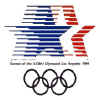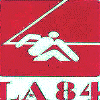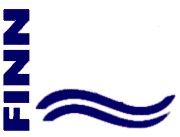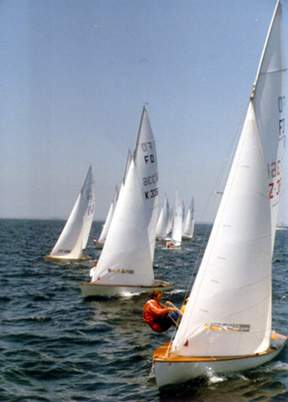


[ Retrospective
] [ Venue ] [ Competition
] [ Results ] [ Highlights
] [ Conclusion ] [ Legacy
]



THE 1984 OLYMPIC YACHTING COMPETITION
The International Yacht Racing Union (IYRU)
IYRU (now known as International Sailing Federation - ISAF) is the international federation for the sport of yachting (now known as sailing). It was founded in 1907 and was headquartered in London. The IYRU delegation was headed by President Beppe Croce (ITA) and Secretary- General Nigel Hacking (GBR). Technical delegates were Sven Hultin (FIN), Chairman of the IYRU Measurement Committee and Tony Watts (GBR), IYRU Chief Measurer. (Click here to see Tony & Sven). The rest of the delegation made up the Measurement Committee and IYRU Jury.
Yachting Classes
There were seven international "one-design" classes designated by IYRU to compete in the 1984 Olympic Regatta. They were:
Origin: Finland 1952

Designer: Ricard Sarby
LOA: 4.5 m Beam: 1.5 m
Sail area: 10.2 mq
Number of crew: 1Origin: Holland 1951

Designer: Conrad Gircher, Uffa Van Essen
LOA: 6 m Beam: 1.8 m
Sail area: 18.1 mq
Number of crew: 2Origin: France 1963

Designer: Andre' Cornu
LOA: 4.7 m Beam: 1.7 m
Sailarea: 12.7 mq
Number of the crew: 2
Origin: Norway 1967

Designer: Jean Herman Linge
LOA: 8.15 m Beam: 1.90 m
Sailarea: 21.70 mq
Number of the crew: 3
Origin: USA 1911

Designer: William Gardner
LOA: 6.92 m Beam: 1.73 m
Sailarea: 26 mq
Number of the crew: 2
Origin: Great Britain

Designer: Rodney Marsh
LOA: 6.1 m Beam: 3 m
Sailarea: 20.4 mq
Number of the crew: 2
Origin: Germany
Designer: Fred Ostermann
LOA: 3.9 m Beam: 0.65 m
Sailarea: ~6 mq
Number of the crew: 1All classes, except the International Finn & Windglider were to be supplied by their own NOCs. In the case of these two classes, LAOOC provided the yachts. In the case of the
Finn Class, 40 boats built by Vanguard of Pewaukee, Wisconsin (then and now Harken - of Peter & Olaf fame) were purchased by LAOOC.
Bic Marine of France, supplied the International Windgliders.Field of Play
The inclusion of a seventh class - the International Windglider - resulted in the addition of a fourth course circle for the first time in the Olympics. The total water area of the four course circles, including the U.S. Coast Guard "restricted area" around the circles, was in access of 40 square miles!!
The Windglider class raced on "Alpha" circle, which was inside the Long Beach breakwater. The Finns and 470s sailed on "Bravo", the Solings and Stars on "Charlie" and the Flying Dutchman and Tornado classes on "Delta". The later three circles were outside the breakwater in the Pacific Ocean.
Click here to view a diagram of the circle locations.
Entries
NOC entries for the 1984 Olympic Regatta were the largest ever by a substantial number, despite the Soviet Bloc boycott. 60 NOCs entered with a total of 172 yachts, which far exceeded the previous record set in Naples in 1960 of 46 NOCs. The addition of the board sailing class to the 1984 program was instrumental to the record turnout.
Measurement
Measurement of all "one design" classes is to ensure that that their hulls, spars, sails and other
equipment conform to class rules. The term "one-design" refers to a class boats' strict standards for materials and methods used in construction. Ultimately, each Olympic boat -- built only by IYRU licensed boat builders to precise size and weight specifications -- is identical to all others in its class. The purpose of "one-design" class racing is to allow the best sailor -- not the best boat -- to win.After three years of pre-Olympic regattas training and with the help of each class's International Measurer and the IYRU Measurement Committee and sophisticated equipment, measurement commenced two weeks before the regatta begin. Even though there were 95 hull, sail or equipment deficiencies recorded, all yachts were eventually measured in.